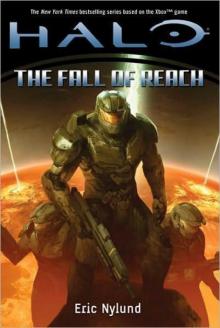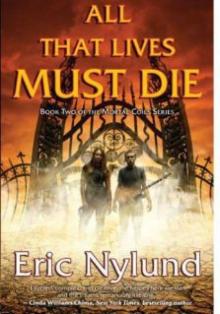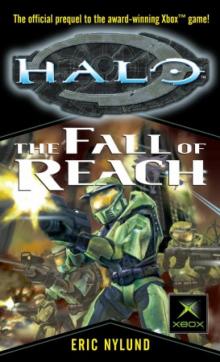- Home
- Eric Nylund
Halo: Evolutions - Essential Tales of the Halo Universe Page 3
Halo: Evolutions - Essential Tales of the Halo Universe Read online
Page 3
“Why me?” asked Soren.
“Pardon?”
“Why am I the one who gets to make a choice? Why not one of the others?”
She turned her gaze to the desk in front of her, her voice distant now, more as if she were speaking to herself than the boy. “What the Spartans are is an experiment,” she said. “In every controlled experiment you need one sample whose conditions are different so as to be able to judge the progress of the larger group. You’re that sample, Soren.”
“We’re an experiment,” he said, his voice flat.
“I won’t lie to you. That is precisely what you are, and you—an experiment within the experiment. An exception to a rule,” she said.
“Why me?” he asked again. “You could have chosen anyone.”
She shrugged. “I don’t know, Soren. It just turned out that way.”
He was silent for a long time, staring straight in front of him, sorting it all out in his head. Finally he looked up.
“I want to do it,” he said.
“You do?” said Dr. Halsey. “Even knowing the risks?”
“Yes,” he said. And then added, “I don’t want to be left behind.”
STRANGE, DR. Halsey thought after he had left. What had he meant by not wanting to be left behind? Where had she heard that before?
She shook her head to clear it. “Déjà,” she said. “You were listening in, I take it?”
“Of course, Dr. Halsey,” said the AI’s smooth voice. Her hologram flickered into existence on the desk beside her. Created specifically for the Spartan project, her self-chosen construct was that of a Greek goddess, barefoot and holding a clay tablet.
“Any thoughts?”
“Is that a rhetorical question?” asked Déjà. When Dr. Halsey didn’t respond, she continued. “You didn’t tell him everything,” the AI said.
“No,” said Dr. Halsey. “I didn’t.”
“I would be remiss not to point out that, as the individual responsible for the intellectual development of the Spartans, you’ve given him faulty information about how a control generally works in a scientific experiment. The control group generally is the group that does not experience the conditions of—”
“I know that, Déjà,” said Halsey, cutting her off.
Déjà nodded curtly. “I would also be remiss not to point out that Soren-66 himself is precociously intelligent and has almost certainly realized that the reasons you gave for allowing him a choice were false.”
“And what were my real reasons?” asked Dr. Halsey.
“I don’t know,” said Déjà. “I have a feeling, however, that I’m as confused about that as you are.”
Dr. Halsey nodded.
“But if I had to guess,” said Déjà, “knowing you as well as I do, I would say that it was a way of easing your own conscience. You just wanted to tell him. You wanted to tell one of them. You wanted to see if just one of them would make the choice for himself.”
Dr. Halsey sighed. “Yes,” she said. “You may be right. Thank you for being honest with me, Déjà.”
“No need to thank me. I can’t help it,” said Déjà. “It’s in my programming.”
Dr. Halsey brushed her hand through the hologram and it disappeared. She leaned back in her chair. I’ve given him a burden to live with, she thought. I’ve let him make his own decision, but Déjà’s right. I’ve shifted the burden of responsibility back to him if anything goes wrong. A child. Carrying my sins.
Let’s hope nothing goes wrong.
FOUR
___________
He was dreaming but even in the dream it was as if he couldn’t wake up, as if he had been asleep for days and days. In the dream he was back in the forest again, but in addition to the cold and the hunger there was also something stalking him, a strange creature, almost human but not quite: deformed somehow, its mouth cast in an odd leer, its body lumpy and irregular, dragging one of its feet behind. It was always just a little way behind him, never quite catching up with him, but he couldn’t seem to shake it, either. He could hear it there crashing through the woods behind him. Every so often it would give a cry of pain that was so piercing that it was all he could do to keep going. How long had he been walking? He ate what he could grab from the ground around him and kept going, dead on his feet, half-asleep, until suddenly he took a wrong turn and found the path before him blocked. And there the creature was, just behind him and on him before he could escape. It plucked him up off the ground like a toy and hurled him. He smashed through limbs and branches and came down hard, the forest around him fading to white as he died.
Only he wasn’t dead. What he saw, all around him, was a blank, uneasy whiteness, filled with a slow buzzing. And then the whiteness slowly resolved into a piercing light. To either side of him, dim shapes began to take form, resolving into heads, the heads themselves covered with white cloth caps, the faces hidden behind breathing masks. Beneath these heads, he saw, the clothing that covered the bodies was spattered and stained with blood. It took him a moment to realize the blood was his own.
One of the heads was speaking, he realized, a low rumbling coming out of it, though he couldn’t understand what it was saying. It stopped and one of the other heads started to make a similar sound. What’s wrong with them, he wondered. And then, What’s wrong with me?
Then a set of fingers waved itself over his eyes. He tried to follow them but could do so only at a slight remove, his eyes moving always just a little late. A head dove down closer to his eyes, suddenly becoming crisply, painfully defined.
“Is he supposed to be like this?” the head asked, its voice muffled through the mask. Then other heads were there, suddenly looming toward him, crisp and almost as if too close. There was a flurry of movement, too, shouting, and then everything became too slow, everything moving oddly and slowly, as if underwater.
This is real, he suddenly realized. This is really happening. Then abruptly the buzzing increased and the thought slipped through his mental fingers and was lost, to be replaced by another dream, another nightmare.
IN THE dream he was sitting in a chair but couldn’t move. There was nothing restraining him, nothing blocking his arms or his legs; he simply couldn’t move. No, wait, he could move a little, could move his eyes very slowly back and forth. At first the room was indistinct, as if the chair were simply sitting in the middle of a vast pool of darkness, but, very slowly, it began to take form around. Not a chair, he suddenly realized, but a bed: He was lying in a bed—how had he ever thought he was sitting upright in a chair? There was a blanket he recognized, but he couldn’t quite place it. The shape of the bed was familiar as well, the shape of the room familiar, too, but he was unable to place where he was until the door at the far end of the room opened and his stepfather, impossibly large, stooped and shouldered his way in.
I’m in my mother’s room, he thought. In my mother’s bed.
And upon thinking that, he began to realize that he wasn’t the only one in the bed, that he wasn’t alone. But he couldn’t turn his head to see who the other person was. His stepfather stood in the doorway, more shadow than man, a strange piping noise coming from him—something with all the structures of a language but impossible for him to even begin to understand. He appeared to be pleading, exhorting, but maybe it just seemed that way.
And then suddenly the other person in the bed moved, began to speak in the same birdlike piping, and though he still didn’t understand a word of it he realized, by the sound and tenor of the voice, that it was his mother. She moved and he saw just the edge of her hand, the skin gray and beginning to rot, to come apart to show a thin strip of bone below. He wanted to scream, but all he could do was let his eyes dart frantically about in his sockets as she slowly shifted in the bed, her hand carefully feeling his face. She gave a low hiss and began to pull herself up.
He was just beginning to see her face when a sudden intense pain washed over him, as if someone had worked broken glass into his veins. The dream wavered
and spun and reduced itself to a small white dot on a black field and then, with a hiss, was gone, leaving nothing but darkness behind.
How long did that last? Impossible to say. He had no sense of time passing, no sense of anything but that limitless void, a vague sense of himself as part of it, but even that seemed to be blurring around the edges, any sense of himself as an individual being threatening to slip away.
And then, very, very slowly, the darkness was broken by a small white dot, a dot which grew larger and larger and in the end swallowed everything around him.
And then it swallowed him as well.
HE AWOKE to find himself screaming. He was restrained, tied down to some sort of table or bed, and he felt like he was on fire, his skin itching and burning. The veins on his arms stood out and pulsed and felt as if they were being torn slowly out of his skin. He flexed his wrist and pulled and the strap around it started to tear. It felt like a series of plate-glass windows were shattering beneath his skin, the muscles quivering and contorting over and into one another.
There were men and women in white coats all around him, but keeping a little distance, except for one, trying to approach him from just behind his head, almost out of sight, with a raised hypodermic. They were all moving slowly, too slowly, as if something was wrong with them, as if they were underwater. He tugged at the strap again and it tore like paper, and then he tugged at the other wrist and both hands were free.
He was still screaming, couldn’t stop. He reached out and grabbed the hand with the hypodermic in it and squeezed, was surprised how quickly his fingers reacted and even more surprised to hear the bones in the man’s wrist cracking like dry wood as they snapped. The sound the bones made was uncomfortably loud. He caught the hypodermic before it hit the floor, jabbing it into the neck of a man on the other side of him, who went down without a sound. The other hand was already tearing the straps off his legs. Some of the others had started to turn now, turning to flee the table, but they were moving so slowly—what was wrong with them? The pain was making it hard to think. He lashed out, struck the nearest one in the back with his fist, was surprised to see the man’s body slam into the far wall and then collapse, leaving a blot of blood on the wall where he had struck.
Then he was out of the bed and running for the door, but something was wrong there, too—he was having a hard time keeping his balance. The whole world seemed to be coming at him at an angle, and his legs weren’t working in the way he expected. He was loping more than running, one shoulder close to the ground, steadying himself against the floor every few meters with an outstretched hand. He seemed to have stopped screaming, though sounds were still pouring out of his mouth, a kind of intense glossolalia, a language without meaning. He barreled through the remaining white-coated figures and they scattered at the slightest touch, thrown to the floor, screaming and groaning. And then he was out into the hall.
Which way? he wondered for the slightest fraction of a second and then darted left. Where was he? It looked familiar, it was somewhere he knew, but the pain was still making it difficult to think. What had they been doing to him?
He reached the end of the hall sooner than he’d expected and slammed into the wall, crumpling the panel with his momentum before turning left again and continuing on his way. Was the wall that weak? Yes, he thought, he knew this place, he knew where he was, the Spartan compound, and then a wave of pain burned through his head and he stumbled and went down screaming.
Almost immediately he was up again. To the end of the hall, he remembered, then right, and then the outer doors. Then he’d be out and free, somewhere where he—where they, he corrected himself—could never find him.
An alarm was going off somewhere, the halls strobed with a red light, but the strobe too was moving too slowly. Again he didn’t stop in time, running into the wall at the end of the corridor and skittering off it before turning right and making for the outer doors.
But between him and it was a line of five or six Marines, kneeling, pointing their weapons at him. And there, standing just behind them, hands on his hips, was CPO Mendez.
“Stand down, soldier!” the man’s voice boomed out. And for just a moment Soren-66, hearing the command from the man he’d been taking orders from for more than a half dozen years now, slackened his pace.
But the pain and the confusion, the sensation he had of being trapped, of being hunted, quickly took over, and he sped up again.
“Stand down!” Mendez called again. Soren was almost on them now. He saw the muscles in the forearms of the Marines tighten slightly as they prepared to pull the trigger, and he suddenly found himself galloping on all fours, like a dog. As Mendez gave the order to fire, he leaped.
He heard the shots, oddly muffled. It wasn’t bullets they were firing, he realized as he saw the blur of red flash by his elbow, but tranquilizer darts. They passed harmlessly below him except for one that he felt stinging in his ankle. He came down and smashed into the line of Marines and was through them, tugging the dart loose as he made for the doors.
He rammed into the doors, found them locked. He hit them hard with his shoulder and they gave a groaning sound, starting to give. He hit them a third time and at the same moment felt the stinging of tranquilizer darts in his back and legs.
He bellowed in pain and frustration and turned to find himself confronted again by the row of Marines, Mendez standing in front of them now, giving every impression of being in control of the situation.
“I asked you to stand down, solider,” stated Mendez. “Will you comply?”
The tranquilizers were starting to take effect. His tongue felt heavy in his mouth. The pain, which had been so visceral, so intense, was now receding into the background. He took a step, found his legs threatening to go out from under him. He started to turn back to the door, stumbled. The hallway lurched, righted itself. He turned back and found now, just behind the line of marines, an out-of-breath Dr. Halsey.
“Don’t hurt him!” she was shouting. “Please!”
“Dr. Halsey!” he cried when he saw her. “What have you done to me?” Arms outstretched, he took a single step toward her and collapsed.
FIVE
___________
When he woke up he was in the brig, his wrists now in titanium wristlets, each of them hooked firmly by a titanium chain to a ring in the wall. He tested them. They were too strong for him to break out of easily.
When he stood, he realized there was something wrong with his legs. They were strong, the muscles differentiated and much larger than before, but the muscles had done something to the bone, twisting them, curving them in the odd directions. One leg was more or less normal, just a little bit bowed and twisted. The other, though, was gnarled and a good six inches shorter, and seemed more comfortable when folded up. That leg’s ankle was rubbery and left the foot flopping. He could still stand but only at an angle, leaning far to the side, and he was more comfortable, he realized, if he used a hand for balance as well.
His arms, too, were rippling with muscle and seemed almost impossibly strong. They were for the most part fine: They were hardly deformed, relatively straight. But the fingers of one hand had become twisted and bowed, functioning now less like individual articulated digits and more like a single pincer or claw. I’ve become a monster, he thought.
HE WAS still trying to take in his new body when the door opened and Dr. Halsey entered, an armed Marine to either side of her.
“Hello, Soren,” she said.
He stood motionless, watching her. She in turn looked him over, both of them waiting out the other.
Finally, she turned to one of the Marines and said, “I don’t think I’ll need you.”
“According to CPO Mendez—” the Marine started.
“This is a science facility and here, I outrank Chief Petty Officer Mendez,” she said. “I want you to leave.” She turned to the other Marine. “Both of you,” she said.
“Is that an order, ma’am?” asked the second Marine, his
voice calm.
“Yes, it is,” she said.
The second Marine quickly saluted and went out. The other, after a moment’s hesitation, followed.
“There,” said Dr. Halsey. “That’s a little bit better. I’m sorry about the restraints. They weren’t my idea, but even I was overruled on that point. I’m afraid I don’t have any means to remove them.” She came closer and sat down on the cell floor, deliberately within easy reach of him. If he’d wanted to, he could reach out and break her neck. “Let’s just do our best to pretend they’re not there,” she said.
Soren stared at her a long moment, then slowly sat back down, gathering his body awkwardly under him.
“How are you feeling?” she asked.
“I don’t know,” he said. His tongue felt awkward in his mouth, as if he was using it for the first time. “Not very good. I’m having a hard time thinking.”
“That’s probably the medication,” she said. “They had to give you something for the pain.”
He closed his eyes, remembering how his body had felt like it was being torn apart from the inside. “Is that normal?” he asked.
She shrugged. “We’re still figuring out what normal is. Some people seem to have pain. For some of them it goes away. For others, it’s always there.”
He nodded.
“We thought you were going to die,” she said, and reached out to touch his arm. He let her touch him for a moment then slowly pulled the arm back and out of reach. “You’ve been comatose for nearly three months. Again and again they thought you were going to die. It reached the point where we decided to disconnect life support. You flatlined for almost four minutes and then your heart started beating on its own again.”
“I wish I had died,” he said flatly.
She shook her head. “You may feel that way,” she said, “but your body doesn’t. It could have let go at any time, but it never did.”

 A Thousand Drunken Monkeys: Book 2 in the Hero of Thera series
A Thousand Drunken Monkeys: Book 2 in the Hero of Thera series Paladin Blake & The Secret City
Paladin Blake & The Secret City A Thousand Drunken Monkeys
A Thousand Drunken Monkeys Halo: Evolutions - Essential Tales of the Halo Universe
Halo: Evolutions - Essential Tales of the Halo Universe Halo: The Fall of Reach
Halo: The Fall of Reach All That Lives Must Die mc-2
All That Lives Must Die mc-2 First Strike
First Strike The Fall of Reach h-1
The Fall of Reach h-1